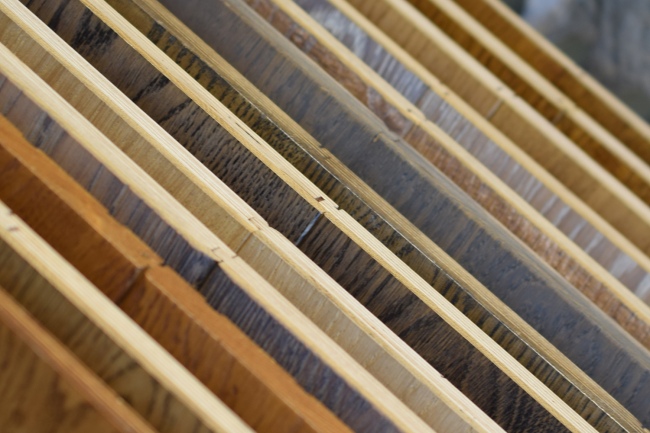What is the best thickness for engineered wood flooring?
25th Aug 2023
Every step towards transforming your living space with oak flooring involves a series of choices to achieve your final result. In this blog post, we'll delve into one of the most crucial decisions you'll make during your flooring journey: choosing the best thickness for your engineered wood flooring.
Engineered wood flooring has gained immense popularity for its ability to combine the classic appeal of solid wood with modern construction techniques to enhance stability and performance. Engineered flooring consists of multiple layers, typically a real wood top layer bonded to layers of plywood or fiberboard. These layers make engineered flooring less susceptible to expansion and contraction due to temperature and humidity changes in comparison to solid wood.
Selecting the right thickness for your engineered flooring is vital, as it can impact not only the aesthetic but also the long-term durability and performance of your investment. So what factors should be considered?
Subfloor Compatibility
The foundation of any flooring project is the subfloor. Its condition and type play a vital role in determining the suitable thickness of engineered wood flooring. Thicker flooring can accommodate minor imperfections in the subfloor, creating a more even and visually pleasing surface. If you're working with an older home or an uneven subfloor, opting for a slightly thicker plank can help mitigate any irregularities.
Installation Method
The thickness of your engineered flooring can influence the installation method. For example: thicker planks are better suited for screw-down/nail-down installations onto joists, whilst with solid subfloors both thin or thicker planks could be used.
Room Height
For rooms with limited room height, a thinner board could be preferable over a thinner board to save valuable space and create an illusion of higher walls.
Existing Floor Levels
Matching existing floor levels can avoid the need to modify already fitted doors and thresholds. Uneven floor levels not only disrupt the visual continuity but can also present tripping hazards, especially in high-traffic areas.

Sound and Heat Insulation
Engineered wood flooring doesn't just enhance the visual appeal of your space; it can also contribute to the overall comfort. Thicker planks provide a degree of sound insulation, helping to reduce the noise transmission between floors. Additionally, they offer better heat insulation, ensuring your floors feel warmer underfoot during colder months.
Resanding Potential
One of the advantages of engineered wood flooring is the ability to refinish it a multiple times to revive its appearance. Thicker wear layers provide more room for sanding in the future. If you anticipate the need for refinishing due to wear and tear, choosing a slightly thicker option can extend the lifespan of your flooring and save you from the hassle of replacing it prematurely.

Durability and Longevity
Thicker engineered wood flooring typically exhibits greater durability and longevity. In high-traffic areas like hallways, living rooms, or commercial spaces, thicker planks can handle the constant foot traffic without showing signs of wear too soon. This durability ensures that your investment in oak flooring maintains its elegance and charm for years to come, even in demanding environments.

Environmental Considerations
In today's environmentally conscious world, the materials we choose for our homes play a crucial role. Thicker engineered wood flooring can contribute to a more sustainable choice. The ability to refinish the flooring multiple times extends its lifespan, reducing the need for replacement and ultimately lowering your environmental footprint.
Value Addition
Investing in engineered oak flooring is an investment in the value of your property. Thicker planks can enhance this value, particularly if they are of premium quality and sustainably sourced.

The best thickness for your engineered wood flooring depends on an array of factors, each contributing to the overall aesthetic, durability, and functionality of your space.
If you would like to discuss what thickness of engineered oak flooring would work best for you, give us a call on 01538 304584.






Add a comment